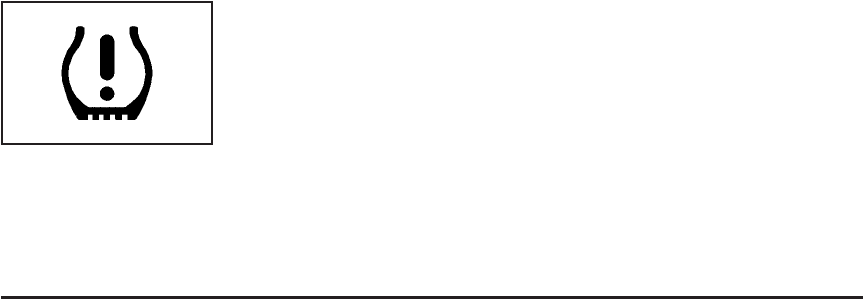
Tire Pressure Monitor Operation
This vehicle may have a Tire Pressure Monitor System
(TPMS). The TPMS is designed to warn the driver when
a low tire pressure condition exists. TPMS sensors are
mounted onto each tire and wheel assembly, excluding
the spare tire and wheel assembly. The TPMS sensors
monitor the air pressure in the vehicle’s tires and
transmits the tire pressure readings to a receiver
located in the vehicle.
The TPMS is designed to alert the driver if a low tire
pressure condition exists. Tire pressure levels may also
be checked using the Driver Information Center (DIC)
steering wheel control buttons. See “Tire Pressures”
under DIC Operation and Displays on page 3-42.
When a low tire pressure
condition is detected, the
TPMS will illuminate the
low tire pressure warning
light located on the
instrument panel cluster.
At the same time a message to check the pressure in a
specific tire appears on the Driver Information Center
(DIC) display. The low tire pressure warning light and the
DIC warning message come on at each ignition cycle
until the tires are inflated to the correct inflation pressure.
For additional information and details about the DIC
operation and displays see DIC Operation and Displays
on page 3-42 and DIC Warnings and Messages on
page 3-45.
The low tire pressure warning light may come on in
cool weather when the vehicle is first started, and then
turn off as you start to drive. This could be an early
indicator that the air pressure in the tire(s) are getting
low and need to be inflated to the proper pressure.
A Tire and Loading Information label, attached to
your vehicle, shows the size of your vehicle’s original
equipment tires and the correct inflation pressure for your
vehicle’s tires when they are cold. See Inflation - Tire
Pressure on page 5-65. For the location of the Tire and
Loading Information label, see Loading the Vehicle on
page 4-21. Also see Inflation - Tire Pressure on
page 5-65.
Your vehicle’s TPMS can alert you about a low tire
pressure condition but it does not replace normal tire
maintenance. See Tire Inspection and Rotation on
page 5-72 and Tires on page 5-59.
Notice: Using non-approved tire sealants could
damage the Tire Pressure Monitor System (TPMS)
sensors. TPMS sensor damage caused by using
an incorrect tire sealant is not covered by the
vehicle warranty. Always use the GM approved tire
sealant available through your dealer/retailer.
5-69


















